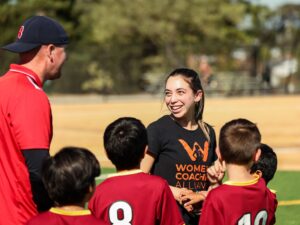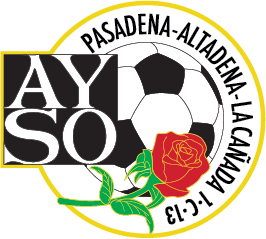Women’s Coaching Alliance
Note: class rescheduled for August 23
- Two young women coach an AYSO team
- They are guided by two older, adult mentors who attend all the practices and games.
- The coaches attend WCA’s leadership class, August 17 at the Claremont Club.
- The coaches also get to attend exclusive development events.
- The coaches are compensated for their time.
- It’s like applying for a job, because it is a job, because WCA wants to show young women that there are careers in sports beyond being an athlete.
Did you know that about 94% of women in executive positions have a background in sports? Ernst & Young also found that female former athletes earn an average of 7% more in annual wages than their non-athlete peers. AYSO is partnering with the Women’s Coaching Alliance to start more young women on a sports coaching career. WCA has done this for a few years in the Bay Area, and now Region 13 is introducing it to LA. This upcoming season, two young women will coach an AYSO team, guided by two adult mentors who attend all the practices and games. The coaches are also compensated for their time with a meaningful stipend. The program kicks off on August 17 with a day of leadership and coaching classes in Claremont. Women aged 15-26 are invited to apply before July 31.
Apply here: https://www.womenscoachingalliance.org/coaching/become-a-coach
Mentors are also needed! Do you want to see more women in sport? Enough to invest 3 hours per week for 10 weeks? Apply to be a mentor.

About WCA’s overall model: each team has 2 youth coaches and 2 adult mentors. At least one mentor should be experienced in the sport, the other doesn’t need to be. It’s ideal if the second mentor brings a different kind of leadership and management background. WCA wants mentors to be focused on optimizing their mentees: working with them on goals, challenging them, developing skills to create grit, handle diverse peeps and above all, building confidence that transcends the pitch.
Tactically, mentoring with WCA requires a commitment of 30 minutes to 3 hours per week during the season. Obviously, those with the most impact are at the higher end of that range. At a base level, it’s a 30 minute catch up meeting (either in-person or over the phone/Zoom) where any issues/challenges that the coaches faced the prior week are discussed, reviewed and optimized for the future. Also, that would be a time to preview the week ahead. When the coaches are minors, one of the mentors will attend the practices and games as the coach of record to supervise safety.
What to talk about: How did practice go? How are the kids coming together? What personalities are you dealing with? How are you staying true to AYSO’s Core Philosophies, specifically Positive Coaching, Player Development and Good Sportsmanship (and even Everyone Plays)? Any issue with parents, communications, other coaches, referees? Beyond that first 30″, attendance at practices and games is how the commit goes upwards to 2-3 hours a week. Obviously, a mentor can have more impact the more time they spend with their coaches and the more they are able to first-hand observe.
A note on “observation” — the youth coaches are the leaders of the team. Full Stop. The mentors should be ‘in the shadows’ and not stepping in realtime. If the coach has an awkward moment and/or doesn’t know what to do in the moment (and no one’s safety is at risk), that’s OK. WCA strongly believes it’s OK to see the coaches experience anxiety and even fail. We believe these uncomfortable places are where the deepest learning happens. So have the grace to let that moment happen (even, crash and burn): do not intervene. And then after the fact, whether it’s right at the end of practice or on the next weekly call, discuss what happened and options to deal with it. For example, let’s say you are at your first practice and 15 minutes in, little Johnny seems to not want to participate. He’s being disruptive and obstinate. How does the coach deal with that? What is the best way to keep the team moving forward, yet also show concern and care for little Johnny. One way is for the coach to go over to the mentor at 5:15PM and ask for guidance. No, thank you. We prefer instead, that the coach tries to figure it out on their own and suggest a plan. Maybe that means putting little Johnny on the sideline for 10 minutes while the team does its next drill or game. And then checking in with little Johnny at 5:25PM or the next water break. As you may know: Being a mentor and sharing your experiences and wisdom with younger, newer folks can be powerfully impactful. And WCA’s system is a vital example of this, and the benefits go beyond the young women, also to the mentors themselves.
